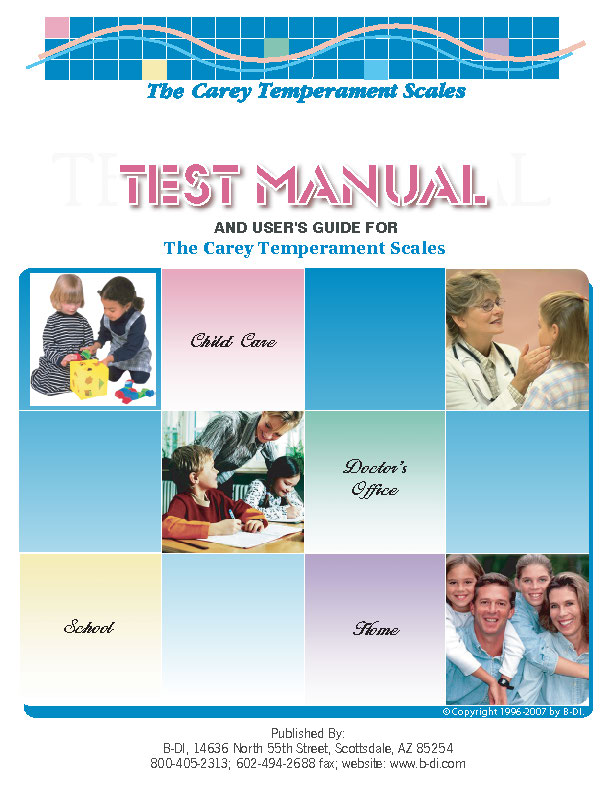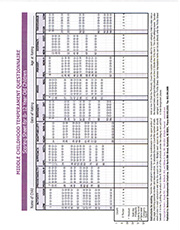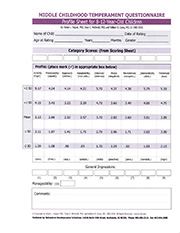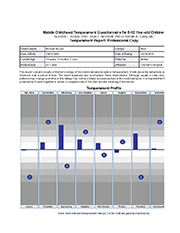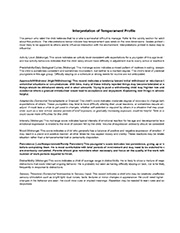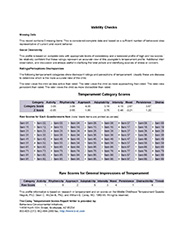Middle Childhood Temperament Questionnaire for 8 to 12 Year Old Children
by Robin L. Hegvik, Sean C. McDevitt and William B. Carey
The Middle Childhood Temperament Questionnaire (MCTQ) is one of the five Carey Temperament Scales and provides information regarding stylistic aspects of
behavior from the beginning of the 8th yearuntil the end of the 12th year. The questionnaire is based on the landmark research of Drs. Alexander Thomas, Stella Chess and associates
in the New York Longitudinal Study. Categories of temperament or behavioral style indicate the "how" of behavior, rather than the what or why.Individual responses to the environment
are based on biological as well as environmental features. Research has shown that infants, children and adults differ in consistent ways from one another on these dimensions that form
of the foundation of individual personality.The MCTQ was published in 1980 and has been used in numerous clinical and research applications over the last 25+ years.
This 99 item caregiver report questionnaire was distilled from behavioral descriptions used in the original NYLS research. The MCTQ measures 9 clinically important categories to describe childhood temperament:activity level, predictability, adaptability, approach to novelty, emotional intensity, quality of mood, sensory sensitivity, distractibility and persistence. These dimensions are readily identified and easily understood by caregivers.
MCTQ Uses
*Clinical use with children and caregivers to identify temperamental contribution to behavior and emotional expression at home and school. Especially useful in situations where caregivers identify stylistic rather than situational or contextual issues as problematic.
*Caregiver consultation to identify specific temperament profile and improve the 'goodness of fit' between caregiver and child in indicated areas of needed accommodation. MCTQ is frequently utilized in parenting, prevention and early intervention programs.
*Development of strategies for reducing aversive behavior by changing methods for dealing with conflict that is temperament related.
*Research that investigates the role of temperament in significant areas of function in the middle childhood period.
Materials available for the MCTQ (Note that costs support ongoing development of this instrument,)
This 99 item caregiver report questionnaire was distilled from behavioral descriptions used in the original NYLS research. The MCTQ measures 9 clinically important categories to describe childhood temperament:activity level, predictability, adaptability, approach to novelty, emotional intensity, quality of mood, sensory sensitivity, distractibility and persistence. These dimensions are readily identified and easily understood by caregivers.
The MCTQ iReport Writer software creates two reports: 1) the professional report includesa temperament profile, interpretations of each category score, validity checks for missing data, social desirability and ratings/perceptions discrepancies as well as category scores, zscores and raw data; 2) the caregiver report which includes the temperamentprofile and temperament category interpretations that are personalized using the name and gender of the child.
MCTQ Uses
*Clinical use with children and caregivers to identify temperamental contribution to behavior and emotional expression at home and school. Especially useful in situations where caregivers identify stylistic rather than situational or contextual issues as problematic.
*Caregiver consultation to identify specific temperament profile and improve the 'goodness of fit' between caregiver and child in indicated areas of needed accommodation. MCTQ is frequently utilized in parenting, prevention and early intervention programs.
*Development of strategies for reducing aversive behavior by changing methods for dealing with conflict that is temperament related.
*Research that investigates the role of temperament in significant areas of function in the middle childhood period.
Materials available for the MCTQ (Note that costs support ongoing development of this instrument,)
Scoring Methods: Hand, Online or etesting.center (100% electronic)
- Professional Practice Sets with Test Manual, Users Guide and questionnaires, scoring and profile sheets.
- Questionnaire refills, with and without scoring and profile sheets.
Click here. - MCTQ iReport Writer software uses and iReport Writer practice sets.
Click here. - etesting.center-MCTQ can be administered and scored using the 100% electronic
etesting.center website. Now available!
Click here.
